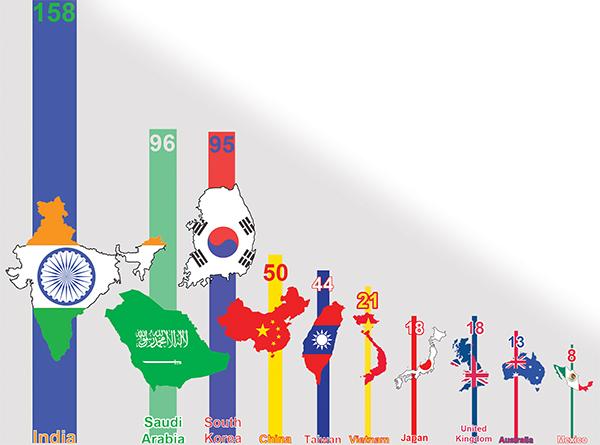Visiting students bring cultural diversity

The number of international students who have attended Sac State through the 2010-2011 school year.
September 18, 2012
Students go to college to explore new territory and meet different people from many walks of life, but for Sacramento State international students, new territory has a whole different meaning.
According to the fall census, there were 818 international students attending Sac State in the 2010-2011 school year. Some of the countries that send the most students to Sac State are India, China, South Korea and Saudi Arabia.
Jack Godwin, director of global education, said international students are fascinating because of the bravery and ambition that come with wanting to study abroad.
“Those stories are one of a kind and that’s what makes them so interesting,” said Godwin.
“People are so ambitious and so courageous because there’s some risk involved. You’re going into unknown territory.”
Adam Kaye, an international student from Australia said he came to study journalism in America because he is a law student back home and felt it would be better to study journalism.
“I was a full-time student back home and I studied law,” said Kaye. “I’m taking my journalism subjects here because the system’s a bit different, so it doesn’t work to study the legal system here.”
Cathrin Mehl, a German international student said she lived in Germany for 17 years before she came to study in America.
“When I came here, it was a huge culture shock,” said Mehl. “It was just school is so much different here, even the scheduling of classes. In Germany, I’m used to having about eight subjects a day, sometimes, or six subjects a day.”
Mehl also said when she first heard American-English, she was amazed because the depiction of it in Germany was accurate.
“One of the stereotypes we have in Germany about the English-American speak is that it sounds like chewing gum in a sense that the syllables are very long, very stretched and not as sharp as British-English,” said Mehl. “That was actually true and it was amazing. For the first couple of times [hearing it], I was mesmerized. I was staring at people thinking ‘They really do talk like that!’ Your language is relaxed and stretched.”
Godwin said despite the cultural difference, international students are just like normal college students experiencing the same things college students at Sac State go through.
“They’re college students and they’re people,” said Godwin. “They have the same cares and worries as anybody. Any student, any person. They’re international scholars, international travelers. They’re immersed in an American culture, a culture that is not their own. They’re just like us at our level of shared humanity, but they are different from us culturally.”
Kaye said comparing the college system in America to Australia is vastly different because you go through college without really meeting new people.
“The whole structure back home doesn’t encourage people to mix as much,” Kaye said. “You go to university, you get your degree and you leave. You don’t get to intermingle with your classmates that much, unless you’re an outgoing person. I don’t think university should be just be education, I think you should be able to meet people as well.”
Mehl also mentioned the difference in Sac State’s architecture compared to school in back Germany.
“The way the schools are built are different,” said Mehl. “In Germany, there’s one building and in here, there are many buildings. That was very funny and a little scary at first.”
Godwin said international education is not just going to school overseas, but it spans over so many things and responsibilities.
“International education is all about academic mobility, credit mobility, degree mobility, cultural mobility and ultimately, human mobility and that’s part of our mission,” said Godwin.
Godwin also adds international education gives students a profound experience and helps them appreciate education more.
“Another great benefit at least long-term, whether semester or yearly, immersion in the culture and when you’re studying or doing scholarship or doing research abroad, it increases future value of your education,” said Godwin. “No matter what field you’re studying, no matter what country you go to or what phase you’re in your professional development, it continues to pay dividends and it continues to increase the future value of your education.”
Camille Anglo can be reached at ca2283@saclink.csus.edu
































































































































